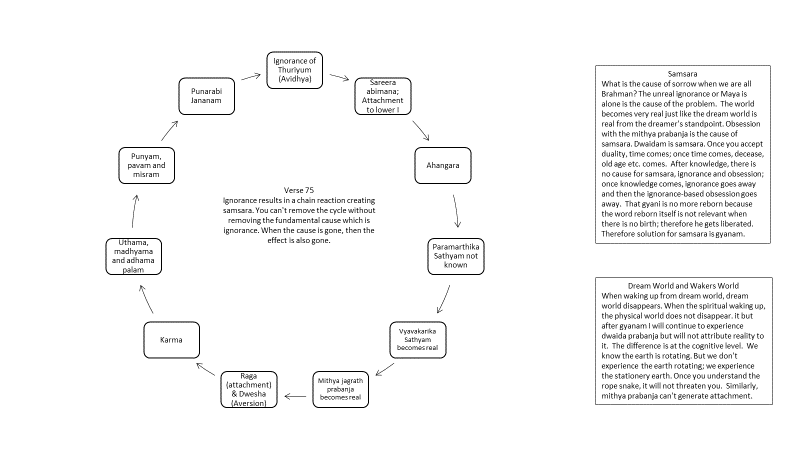Mandukya Upanishad, Class 72
When we ask is the world is real or
not, we should remember from which standpoint. From the standpoint of the
body, viswa, karma etc. world is real and capable of affecting the waker
also. From vyvakarika dhrishti world is born and is real. But in Vedanta,
we are trying to look at the world from the standpoint of thuriyum. From
thuriya dhrishti, or paramarthika dhrishti, we say the world did not
originate. Exactly like the dream world did not originate from the standpoint
of waker. This world of duality is very much there from the standpoint of
mithya vyavakaraha. From the vyvakarika dhrishti we do not naturally wake
up. Ignorance never end by itself. Every object in nature have a
natural death. Other than Brahman, avigyanam will not die
naturally. We require sastra, guru and students for avidhya or ignorance
to end. Other systems of philosophy also do not have paramarthika
dhrishti. Vedanta use logic, but it is subservient; it is sastram.
For materialistc purposes tharka or logic may be required but not for vedantic
philosophy. From dwaida philosophy or vyavakarika dhrishti they will
never understand the teaching from paramarthika dhsrishti. They also
misunderstand us. When we say world is unreal, it is from the standpoint
of thuriyum. But from another standpoint, the world is very real.
They get confused between vyavakarika and paramarthika dhrishti.
Verse 74
Up until now we are saying Brahman
is nondual and kariya karana vilakshanam. It is beyond time as cause and
effect are subject to time. Now Gowdapadha says, really speaking Brahman
can’t be called nirvikaram also. The very name nirikaram is given only
from vyavakarika dhrishti. Because from vyavakaika dhrishti, speaking talk
about Brahman as karanam or savikaram subject change producing effect.
Since from vyakarika angle, they are looking up on Brahman, we are forced to
negate that notion by using the word nirivikaram. From paramarthika
dhrishti, since savikaram itself is not there, we need not use the word
nirvikaram also. Similarly, from vyavakirka dhrishti, they call Brahman
sagunam; because they use the word sagunam, advaidam uses word nirguranm.
Every definition of Brahman is given only from the standpoint of vyavakarika
misconception. Once the misconception is gone, we will withdraw all the definition
of Brahman. If we have negated vyavakarika prabanja, we will negate all
the words like sathyam, sagunam, vikaram, gyanam. From paramarthika
dhrishti, silence is the only definition of Brahman. Amathra is the only
definition of thuriyum. Thuriyum is also not the correct word, since it
implies the fourth, but when you negate the first three padhas, thuriyum can’t’
be called thuriyum. From paramarthika dhrishti, it can’t even be called eternal. When
you negate the impermanent world, you can’t call it eternal. This verse
is similar to 33rd verse of second chapter. After negating dwaidam, we
won’t use the word advaidam.
Verse 75
With the previous verse, the
summarization of Upanishad is over for now. In 75 to 86, Gowdapadha talks
about problems of humans. What is the cause of sorrow when we are all Brahman?
I can never become a samsari, because becoming is a change. If this is
true, then why do you suffer. The reason is avidhya or agyaam The
unreal ignorance or Maya is alone is the cause of the problem. Why did we
get this ignorance? Ignorance never came, it is anadahi. Because of
this anadhi avidhya, I have fallen without falling. Because of ignorance,
we have fallen into viswa and taijasa. From this standpoint, the
individuality, the world becomes very real just like the dream world is real
from the dreamer’s standpoint. The more I get involved in it, the more
real it becomes, just like a movie. Obsession with the mithya prabanja is
the cause of samsara. Beginning with body mind complex, all the
relationships etc. we get absorbed to such an extent, we do not believe
when vedanta says it is mithya. It is not easy; one has to soak in
vedanta to get out of this mechanical life.
There is no duality born from
Brahman; There is only a very strong obsessive notion regarding a duality which
is really nonexistent. In vedanta, dwaidam is samsara. Duality
means time and space. In deep sleep, there is not duality; there is no
time. Once you accept duality, time comes; once time comes, decease, old
age etc. comes. After knowledge, there is no cause for samsara:
ignorance and obsession; once knowledge comes, ignorance goes away and then the
ignorance-based obsession goes away. That gyani is no more reborn because
the word reborn itself is not relevant when there is no birth; therefore he
gets liberated. Therefore, solution for samsara is gyanam.
Verse 76
Ignorance is the cause of samsara
and knowledge is the only solution. Ignorance makes me think I am not
thuriyum. Because this fact was not known, then I mistake myself as viwa
or taijasa or pragya. From the standpoint of body, I become kartha and boktha;
As a kartha, I produce karma palam.
Agyanam causes dheha abimana; dheha abimana results in karma; karma results in karma palam. Karma palam can be uthama (punyam), madhyama (misram) and adhama (pavam). Higher karma palam will take me to higher lokas and lower karma palam will take me to lower lokas, Madhya karma palam will result in punarabi jananm and punarabi manam. Gyani does not have dheha abimana and because of that his actions do not produce karma. When the cause is not there, how can there be effect?
